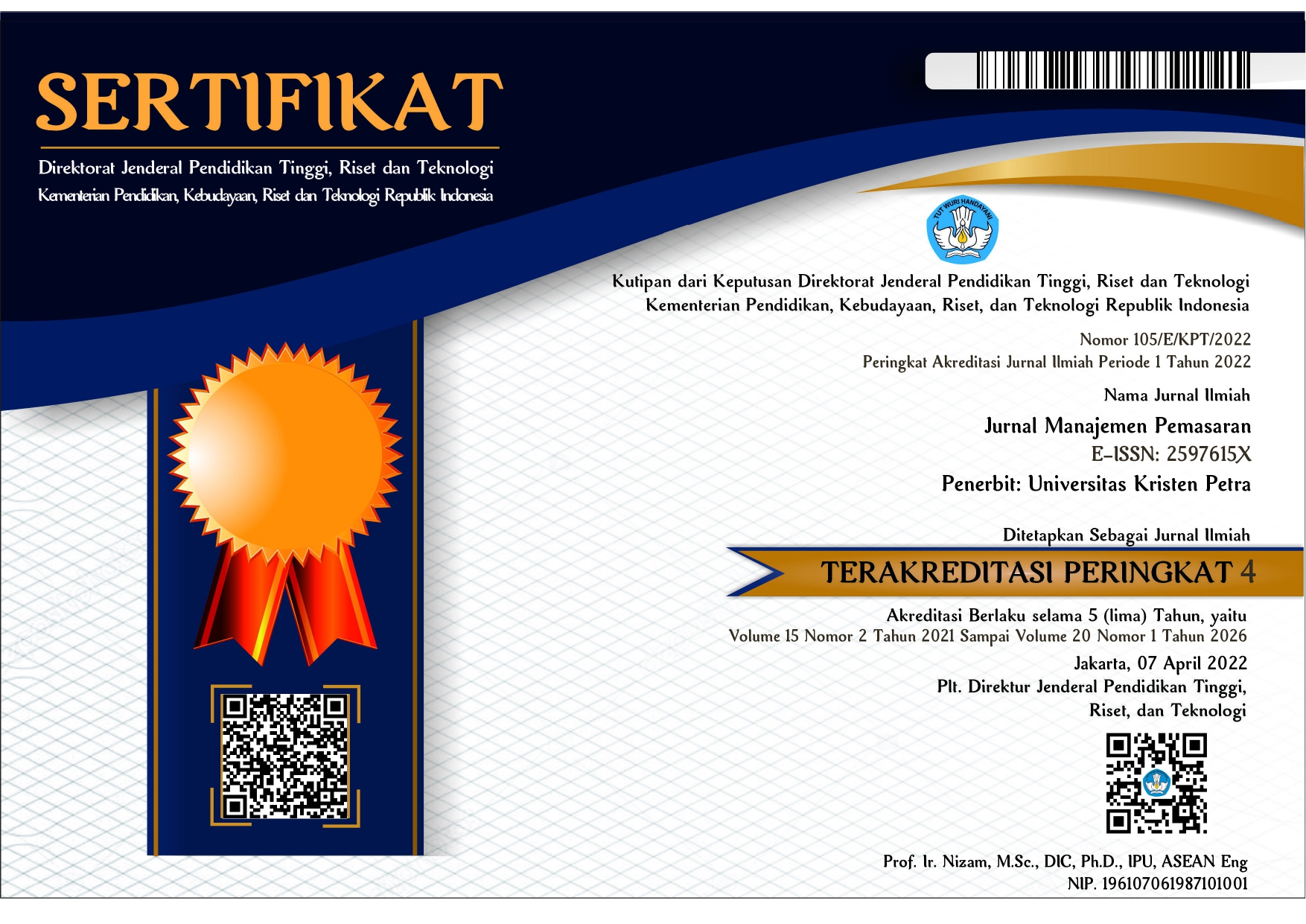ANALISIS PENGARUH INOVASI, PENGAMBILAN RESIKO, OTONOMI, DAN REAKSI PROAKTIF TERHADAP KAPABILITAS PEMASARAN UKM KULINER DAERAH DI JABODETABEK
 :
:
https://doi.org/10.9744/pemasaran.8.2.90-96
Keywords:
Entrepreneurship orientation, innovation, risk, autonomy, pro-active, marketing capability, traditional culinaryAbstract
Indonesian traditional culinary businesses must face a competitive environment due to the influx of imported food products and the change of culinary taste of the younger generation. Therefore, it is necessary for small scale culinary businesses to enhance their capacity to be able to compete in the business by taking autonomous, proactive, innovative and risk-taking steps that leads to better Marketing Capability. In this research Entrepreneurship Orientation is observed through seven dimensions namely: product capability, price, place, promotion, people, process and physical evidence. This research involved 200 culinary SMEs in the area of Jabodetabek (Jakarta, Bogor, Depok, Tangerang, Bekasi) that were randomly selected as respondents and this research concluded that there is a positive effect from autonomous, innovative and risk-taking efforts towards the Marketing Capability. Meanwhile proactive effort has a negative effect towards the Marketing Capability of the Culinary SMEs in Jabodetabek. The Marketing Capability is indicated by the promotion capability, human resources capability, process capability, and the capability of the chosen place or venue for the culinary business.References
Agus Pramono (2014), Lezatnya Bisnis Kuliner. Penerbit: PT. Gramedia, Jakarta
Soehadi, A.W., Suhartanto, V. E., Winarto & Kus-mulyono, M.S. (2011). Entrepreneurship Education. Cetakan ke-1, Penerbit: Prasetya Mulya Publishing Jakarta.
Kustituanto, B., & Badrudin, R. (1995). Statistika Ekonomi 1. Cetakan ke-1. Penerbit: Sekolah Tinggi Ilmu Ekonomi YKPN, Yogyakarta.
Best R. (2009). Market Base management, Strategy for Growing Consumer, Value and Profitability. New Jersey. Pearson Education. Inc.
Lovelock, C.H., and Wright, L.K. (2007), Manajemen Pemasaran Jasa. Cetakan ke-2. Penerbit: PT Macanan Jaya Cemerlang, Jakarta.
Deshpande, R. (1999). Forecasting Marketing, Jour-nal of Marketing. 63(3). Pp. 164-167.
Ginting, Nembah F. Hartimbul (2011). Manajemen Pemasaran. Cetakan ke-1, Penerbit: CV Yrama Widya, Bandung.
Hendro & Chandra (2006). Be A Smart And Good Entrepreneur, Cetakan Pertama, Penerbit: CLA Publising.
Gitosudarmo, I. (2008). Manajemen Pemasaran. Edisi ke-2, Cetakan Pertama, Penerbit: BPFE, Yogyakarta. Mullins, J.W. & Walker, Jr., O.C. (2013). Marketing Management. Edition 8, McGraw-Hill Interna-tional. Karunakaran, K. (2008). Marketing Management. Publisher: Himalaya Publishing House Loca-tion: Mumbai, IND.
Kotler, P., & Armstrong, G. (2012). Prinsip-Prinsip Pemasaran. Alih Bahasa Bambang Sarwiji. Jakarta.
Kotler, P., & Lane, K. (2009), Manajemen Pemasaran. Edisi ke-12. Alih Bahasa Benyamin Molan. Jakarta.
Donald, F.K. (2009), Introduction to Entrepreneurship. Edition Eighth. Penerbit: South-Western Cengage.
Lovelock, C., & Wright, L.K. (2012), Manajemen Pemasaran Jasa: People, Technology, Strategy. New Jersey: Prentice-Hall. Mahajan, C.P. (2008), Sales and Marketing Manage-ment. Publisher: ABD Publishers Location: Jaipur. IND.
Malahayati & Ramadhan, H.E. (2014), 99 Peluang Bisnis Buat Anak Muda. Cetakan ke-7. Penerbit: Penebar Plus. Jakarta.
Astamoen, M.P. (2005). Entrepreneurship Dalam Perspektif Kondisi Bangsa Indonesia. Cetakan Pertama, Penerbit: Alfabeta, Bandung.
Michael, H.M., Minet, S., & LaForge, R.W. (2002), Entrepreneurial Marketing: A construct for Inte-grating Emerging Entrepreneurship and Marketing Perspectives, Journal of Marketing Theory and Practice, Fall Issue.
O’Shannassy (2008). Sustainable Competitive advantage or Temporary Competitive Advantage Improving Understanding of an Important Strategy Construct, Journal of Strategy and Management. 1(2), pp. 168–180.
Rapatata. (2014). Top 50 Bisnis Kuliner Unik Super Kreatif. Cetakan Ke 1 Penerbit: Plus + (Penebar Swadaya Group). Jakarta.
Azwar, S. (2012). Reliabilitas dan Validitas. Edisi ke-4. Cetakan ke-1. Penerbit: Pustaka Pelajar, Yogyakarta.
Wijanto, S.H. (2008). Structural Equation Modeling dengan Lisrel 8.8. Cetakan Pertama, Penerbit: Graha Ilmu. Yogyakarta.
Suryana (2008), ”Kewirausahaan” Cetakan ke-4, Penerbit : Salemba Empat, Jakarta. Tambunan, T.T.H. (2009). UMKM di Indonesia. Edisi Pertama. Cetakan Pertama. Penerbit: Ghalia Indonesia. Bogor. Sitinjak, T.Jr., & Sugiarto. (2006). Lisrel. Edisi Per-tama. Cetakan Pertama. Penerbit: Graha Ilmu. Yogyakarta.
Undang-Undang Republik Indonesia Nomor 20 Tahun (2008). Tentang Usaha Mikro Kecil dan Menengah (UMKM). Jakarta.
Santos, V.L., & Sanzo-Peres, M.J. (2007). Marketing Capabilities Development in Small and medium Enterprises: Implications for Performance.
Khansa, Z., Javaid, N., Arshad, A., & Bibi, S. (2012). Impact of Internal Marketing on Market Orientation and Business Peformance, International Journal of Business and Social Science, 3(12), pp. 76–87.















